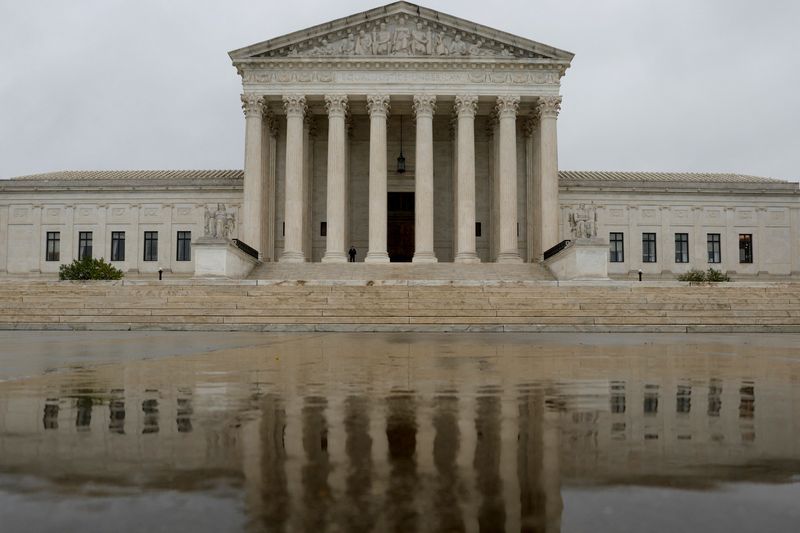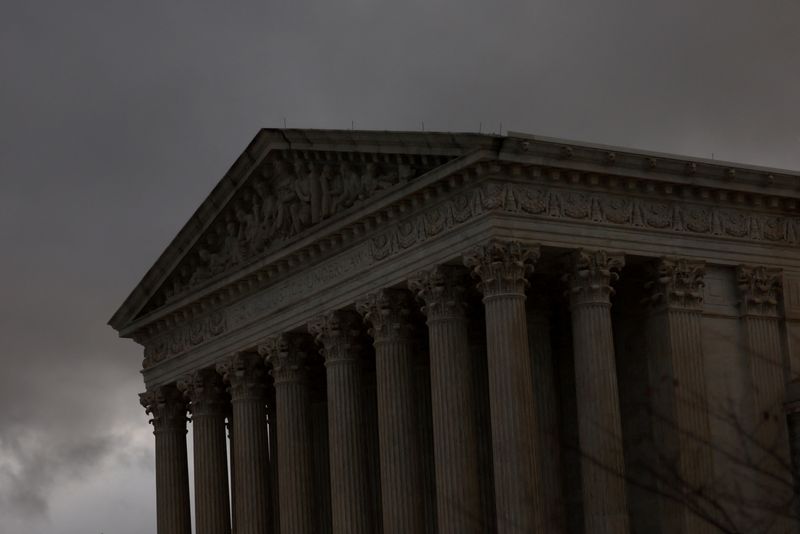By Andrew Chung and Nate Raymond
WASHINGTON (Reuters) -The U.S. Supreme Court's conservative majority on Wednesday appeared to ready to limit judicial power to overrule voting policies crafted by state politicians but might not go as far as Republican North Carolina lawmakers want in a case the liberal justices painted as a threat to American democratic norms.
The court heard arguments in a case the state lawmakers have used to try to persuade the justices to endorse a contentious legal theory gaining traction in conservative legal circles that would prevent state courts from reviewing the legality of actions by state legislatures regulating federal elections.
The Republican lawmakers are appealing the top North Carolina court's decision to throw out the map they devised for the state's 14 U.S. House of Representatives districts as unlawfully biased against Democratic voters. Another state court then replaced that map with one drawn by a bipartisan group of experts.
The Supreme Court has a 6-3 conservative majority, and its most conservative justices including Samuel Alito, Clarence Thomas and Neil Gorsuch appeared willing to embrace the "independent state legislature" doctrine presented by the Republican legislators.
While the conservative justices in general asked questions that indicated skepticism toward the state court actions, some signaled that the Republican argument that state constitutions cannot constrain the power of legislatures in setting rules for congressional and presidential elections might go too far.
Under the once-marginal legal theory they are now promoting, the lawmakers argue that the U.S. Constitution gives state legislatures - and not other entities such as state courts - authority over election rules and electoral district maps.
The court's liberal justices suggested the doctrine could free legislatures to adopt all manner of voting restrictions. Lawyers arguing against it also said it could sow confusion by allowing voting rules that vary between state and federal contests.
"This is a proposal that gets rid of the normal checks and balances on the way big governmental decisions are made in this country," liberal Justice Elena Kagan said, referring to the interaction between the executive, legislative and judicial branches of government. "And you might think that it gets rid of all those checks and balances at exactly the time when they are needed most."
America is sharped divided over voting rights. Republican-led state legislatures have pursued new voting restrictions in the aftermath of Republican former President Donald Trump's false claims that the 2020 election was stolen from him through widespread voting fraud.
The court's eventual decision, due by the end of June, could apply to 2024 elections including the U.S. presidential race.
During the three-hour argument, the justices touched on the issue of enabling federal courts to review state court actions to ensure that judges do not behave like legislators or unfairly apply vague state constitutional provisions such as those requiring free and fair elections to disempower lawmakers.
Conservative Chief Justice John Roberts wondered whether such broadly worded provisions provide proper "standards and guidelines" for state courts to apply.
ALITO WEIGHS IN
Alito dismissed arguments that legislatures would be unchecked if the Republican position carried the day.
"Under any circumstances, no matter what we say the 'Elections Clause' means, Congress can always come in and establish the manner of conducting congressional elections," Alito said, referring to the Constitution's elections language.
The doctrine is based in part on the Constitution's statement that the "times, places and manner" of federal elections "shall be prescribed in each state by the legislature thereof." The Republican lawmakers argued that the state court usurped the North Carolina General Assembly's authority under that provision to regulate federal elections.
Kagan said the theory would free state legislators to engage in the "most extreme forms of gerrymandering" - drawing electoral districts to unfairly improve a party's election chances - while enacting "all manner of restrictions on voting," noting that lawmakers by virtue of coveting re-election may have incentives to suppress, dilute and negate votes.
Kagan said the theory also could let legislatures insert themselves into the process of determining winners in federal elections - a sensitive issue following the Jan. 6, 2021, U.S. Capitol attack by Trump supporters who sought to block congressional certification of Biden's 2020 election victory.
'HISTORICAL PRACTICE'
Some conservative justices appeared to balk at aspects of the Republican arguments.
Justice Brett Kavanaugh emphasized the "historical practice" that "nearly all state constitutions regulate federal elections in some way." Roberts said another check on a legislature's power - a state governor's veto - "significantly undermines the argument that it can do whatever it wants."
David Thompson, arguing for the North Carolina lawmakers, said the Constitution "requires state legislatures specifically to perform the federal function of prescribing regulations for federal elections. States lack the authority to restrict the legislature's substantive discretion when performing this federal function."
Kavanaugh told Thompson that his position on the theory's breadth "seems to go further" than that conceived by then-Chief Justice William Rehnquist in a concurrence to a 2000 ruling deciding a presidential election's outcome - an opinion seeing state courts as exceeding their authority on federal elections.

North Carolina's Department of Justice is defending the state high court's February ruling alongside the voters and voting rights groups that challenged the map approved by the legislature in November 2021. They are backed by Democratic President Joe Biden's administration.
Elizabeth Prelogar, arguing for Biden's administration, said empowering state legislatures the way the Republicans want would "wreak havoc in the administration of elections across the nation" and cause federal courts to become flooded with lawsuits concerning state-administered elections.
